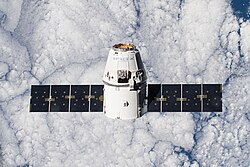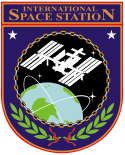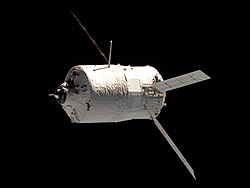Progress M1-7
| Progress M1-7 (Прогресс М1-7) | |||
 | |||
| Tillverkare | RSC Energia | ||
|---|---|---|---|
| Modell | Progress-M1 11F615A55 | ||
| Färdens tid | 113 dagar, 7 timmar | ||
| NSSDC-ID | 2001-051A[1] | ||
| Uppskjutning | |||
| Startplats | Kosmodromen i Bajkonur 1/5 | ||
| Raket | Sojuz-FG | ||
| Uppskjutning | 26 november 2001, 18:24:12 UTC | ||
| Återinträde | |||
| Återinträde | 20 mars 2002, 01:27 UTC | ||
| Omloppsbana | |||
| Apogeum | 254 km | ||
| Perigeum | 192 km | ||
| Banlutning | 51,6° | ||
| Varv | 1 770 st[2] | ||
| Dockning | |||
| Rymdstation | ISS | ||
| Dockning | 28 november 2001, 19:43:02 UTC | ||
| Dockningsport | Zvezda, bak | ||
| Ur dockning | 19 mars 2002, 17:43:04 UTC | ||
| Tid dockad | 112 dagar | ||
| Kronologi | |||
| |||
Progress M1-7 (ryska: Прогресс М1-7) eller som NASA kallar den, Progress 6 eller 6P, var en rysk obemannad rymdfarkost som levererade förnödenheter, syre, vatten och bränsle till rymdstationen ISS. Den sköts upp med en Sojuz-FG-raket från Kosmodromen i Bajkonur den 26 november 2001 och dockade med ISS den 28 november.
Dockningen kunde inte fullbordas, den 28 november på grund av att delar som lossnat från Progress M-45 blivit kvar framför Zvezdas dockningsport. Efter att en rymdpromenad gjordes där man plockade bort en gummiring från dockningsporten, kunde dockningen slutföras, den 3 december.
Den lämnade rymdstationen den 19 mars 2002 och brann upp i jordens atmosfär den 20 mars 2002.
Källor
Fotnoter
- ^ ”NASA Space Science Data Coordinated Archive” (på engelska). NASA. https://nssdc.gsfc.nasa.gov/nmc/spacecraft/display.action?id=2001-051A. Läst 1 mars 2020.
- ^ Manned Astronautics - Figures & Facts Arkiverad 9 oktober 2007 hämtat från the Wayback Machine., läst 15 juli 2016.
| |||||||||||||||||||||||||
| ||||||||||||||||||||||||||||||||
| ||||||||||||||||
Media som används på denna webbplats
ISS Progress cargo spacecraft (NASA)
An unpiloted Progress 11 supply vehicle departs from the Pirs Docking Compartment on the International Space Station (ISS) at 2:42 p.m. (CDT) on September 4, 2003 for another month alone in orbit, as part of a Russian scientific experiment. It will then be deorbited with its load of trash and unneeded equipment and burn in the Earth's atmosphere.
This image, photographed by one of the Expedition 42 crew members aboard the International Space Station, shows the SpaceX Dragon cargo craft approaching on Jan. 12 2015 for its grapple and berthing and the start of a month attached to the complex. Dragon carried more than 2 ½ tons of supplies and experiments to the station.
ISS021-E-017623 (30 Oct. 2009) --- Backdropped by a cloud-covered part of Earth, the unpiloted Japanese H-II Transfer Vehicle (HTV), filled with trash and unneeded items, departs from the International Space Station. European Space Agency astronaut Frank De Winne, Expedition 21 commander; NASA astronaut Nicole Stott and Canadian Space Agency astronaut Robert Thirsk, both flight engineers, used the station's Canadarm2 robotic arm to grab the HTV cargo craft and unberth it from the Harmony node's nadir port. The HTV was successfully unberthed at 10:18 a.m. (CDT) on Oct. 30, 2009, and released from the station's Canadarm2 at 12:32 p.m.
Progress-M logistics resupply spacecraft.
A Progress supply ship linked up to the orbiting International Space Station (ISS) at 3:48 GMT, November 18, bringing Expedition 1 commander William M. Shepherd, pilot Yuri P.
Gidzenko and flight engineer Sergei K. Krikalev two tons of food, clothing, hardware and holiday gifts from their families. The photograph was taken with a 35mm camera and the film was later handed over to the STS-97 crew members
for return to Earth and subsequent processing.Backdropped by a cloud-covered part of Earth, the Orbital Sciences' Cygnus cargo craft approaches the International Space Station, photographed by an Expedition 40 crew member. The two spacecraft converged at 6:36 a.m. (EDT) on July 16, 2014.
ISS026-E-037172 (24 Feb. 2011) --- Surrounded by the blackness of space, the European Space Agency's "Johannes Kepler" Automated Transfer Vehicle-2 (ATV-2) approaches the International Space Station. Docking of the two spacecraft occurred at 10:59 a.m. (EST) on Feb. 24, 2011.













